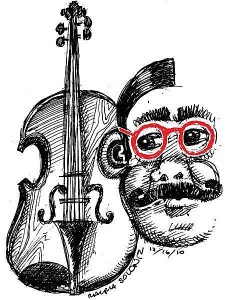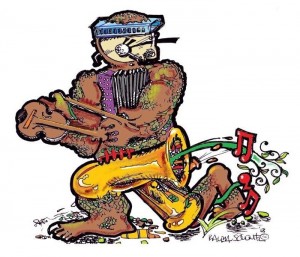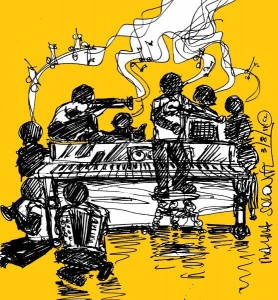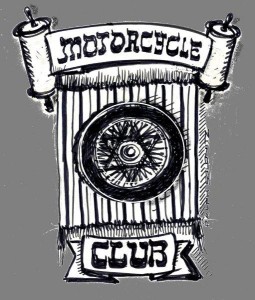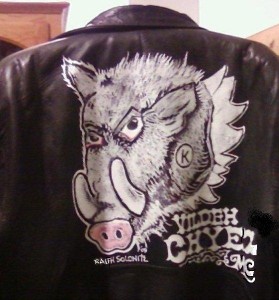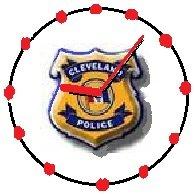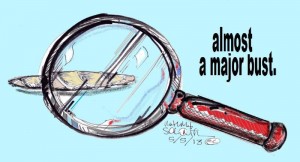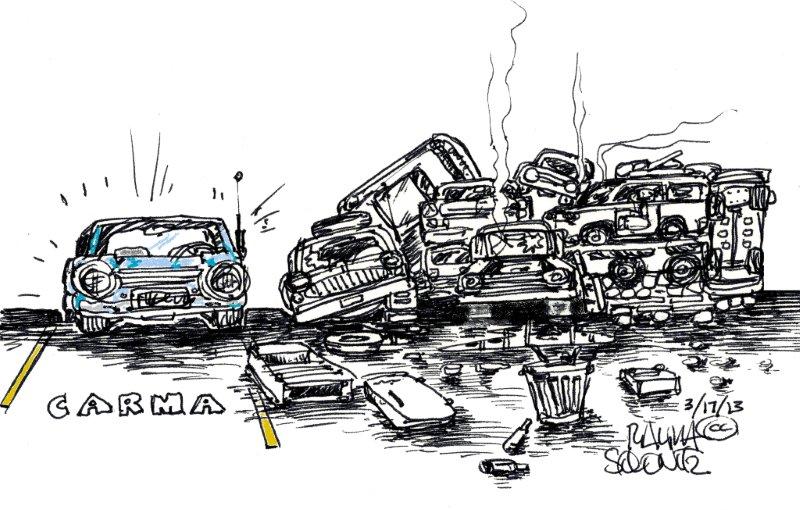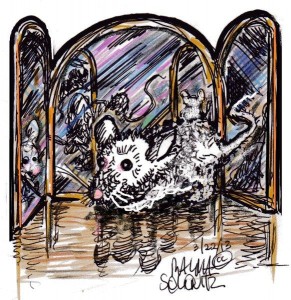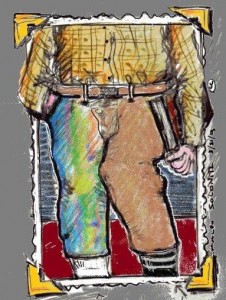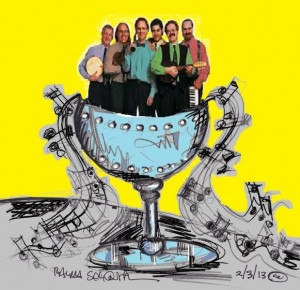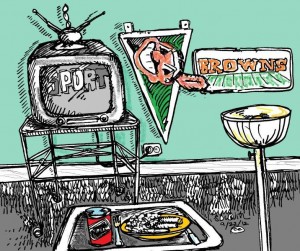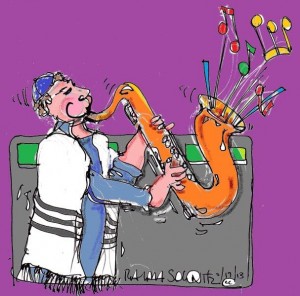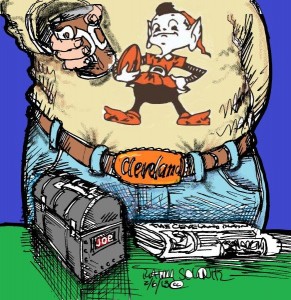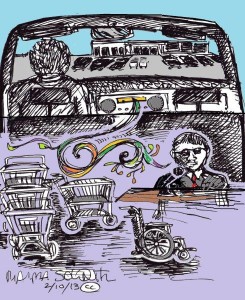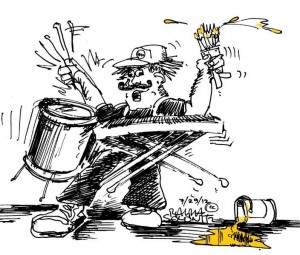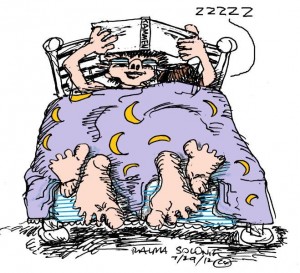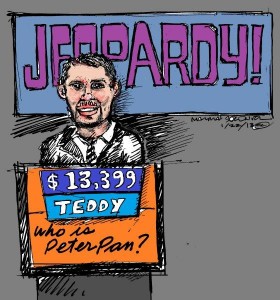THE KLEZMER BLINDFOLD TEST
Yiddishe Cup‘s Bert Stratton tries to identify musicians and songs from selected recordings. Stratton received no prior information. Ratings are 1 to 5.
***
1. “Oy Avram” Yiddish Princess
This recording reminds me of Daniel Kahn, the young Jew in Berlin. Maybe he’s not so young. Let’s call him 35.
Middle age is a long slog, isn’t it? What about 63, is that still middle age?
 What’s really, really old? Anybody 10 years older than yourself.
What’s really, really old? Anybody 10 years older than yourself.
The lead singer on this is Sarah Cooper — or whatever her name is. She has a leaf blower in her right lung. Sing, baby, sing! I give it a 5.
Sarah Mina Gordon, vocals; Michael Winograd, synths; Avi Fox-Rosen, guitar; Yoshie Fruchter, guitar; Ari Folman-Cohen, bass; Chris Berry drums.
***
2. “Blooz” Michael Winograd’s Infection
My philosophy is do something new every day, but always in relationship to the past and tradition. If I have Kashi Island Vanilla today, I go with Kashi Autumn Wheat tomorrow. Sugar Pops, no thanks. Corn Pops, double no thanks. Call them what you will. Joe’s O’s or Cheerios? Depends. I’ll go with Joe’s on Mondays and Cherrios on Tuesdays. And don’t forget Ralston’s Tasteoos.
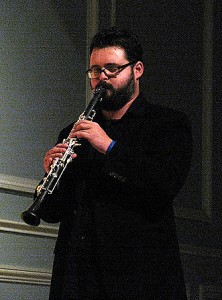
Miguel Winograd
This tune? This is the Wino, Michael Winograd, on clarinet. He constructs his tunes with great care: one note, then silence, then another note. Give it a 5.
Michael Winograd, clarinet; Frank London, trumpet; Daniel Blackberg, trombone; Brandon Seabrook guitar; Michael McLaughlin, accordion; Jason Nazary, drums.
***
3. “Sher 199” Bessarabian Hop. Michael Winograd
Again with the Wino? He’s sucking up all the klezmer oxygen. Is he living in Barcelona? New York? L.A.? He probably has three houses. He’s big.
His clarinet is Canadian, that much I know.
I have no idea who his sidemen are, but they are very, very flexible. They play with time and stretch out the composition. The accordion is a little choppy. It’s a 4.
Winograd, clarinet; Joey Weisenberg, mandolin; Patrick Farrell, accordion; Pete Rushefsky, tsimbl; Daniel Blacksberg, trombone; Nick Cudahy, bass; Richie Barshay, drums.
***
4. “Epstein” Poykler’s Shloft Lied. Matt Temkin’s Yiddishe Jam Band
That’s got to be Temkin. He wears his hat backwards and hangs out in Brooklyn.
I know another backwards hat-wearing drummer, but in Cleveland. My guy is Greek and does apartment cleanups after fires. Married to a Jewish girl. Plays some Jewish.
Frank London is on trumpet. That’s a no-brainer. He’s on every klezmer record.
Clarinet and keys? I have no idea.
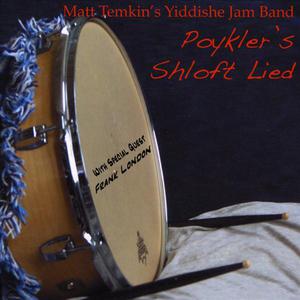 Temkin hires sidemen from the same Brooklyn Home Depot parking lot as Winograd. I wish the Home Depot in Cleveland had this kind of talent. Give it a 4.
Temkin hires sidemen from the same Brooklyn Home Depot parking lot as Winograd. I wish the Home Depot in Cleveland had this kind of talent. Give it a 4.
Temkin, drums; Mike Cohen, reeds; Binyomin Ginzberg, keys; Brian Glassman, bass; Rachel Lemisch, trombone; Allen Watsky guitar: Frank London. trumpet.
***
5. “Baladi” Balada. Bulgarian Wedding Music. Yuri Yunakov
This is Slavic Soul Party. Heavy brass and breakneck tempos. These guys drink slivovitz by the gallon. I have one word for them: slow down. Give it a 3.
Yunakov, alto sax; Neshko Neshev, accordion; Lauren Brody, synth; Seido Salifoski, dumbek; Catherine Foster, clarinet; Carol Silverman, vocals.
***
6. “Shake Hands with your Uncle Max” The Jewish Songbook. Jason Alexander
 Who is the singer? He bears a strong resemblance to an incompetent. Give it a 3. No, a 2. I’m seeing ghosts, I’m fainting. Give it a 1.
Who is the singer? He bears a strong resemblance to an incompetent. Give it a 3. No, a 2. I’m seeing ghosts, I’m fainting. Give it a 1.
Alexander, vocals; Mike Garson, piano; Chuck Berghofer, bass; Don Heffington, drums; Marc Ellis, guitar.
***
7. “Mazl Tov Dances” You Should Be So Lucky! Maxwell Street Klezmer Band
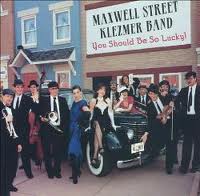 A Mickey Katz tune, yes! This is KCB [Klezmer Conservatory Band].
A Mickey Katz tune, yes! This is KCB [Klezmer Conservatory Band].
Yes, I know the Mickey Katz reboot is over, but not for me. I knew Mickey’s cousin. She was in a nursing home in Cleveland. She was about 100. My hobby is Mickey’s geo-hagiography. I walk by his [former] apartment in Cleveland Heights all the time.
The music is harmonically deep and soulful. Give it a 5. Thank you, KCB!
Ralph Wilder, clarinet; Alex Koffman, violin; Ivo Braun, trumpet; Sam Margolis, trombone; Gail Mangurten, piano; David Rothstein, bass; Steve Hawk, percussion.
***
8. “Meshugge ’bout my Myed’l” Klezmerfats! Peter Sokolow
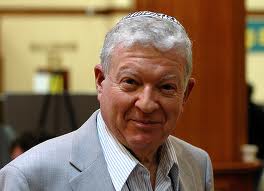
Pete Sokolow
Sokolow is — forgive me — an animal. A rhythmically complex animal. Not only can he bang out chords, he can play — and can he talk; he’ll drey you a kup for three straight hours at KlezKamp, and all good stuff. Read his interview with professor Phil Brown. That’s the best musician interview ever.
Pete combines earthiness, gravity and buoyancy. What’s his weight these days?
I like to guess ages and weights. I’m taking this blindfold off.
Oh jeez, why didn’t you tell me you’re 500 pounds!
Pete, he’s ancient. He’s 73.
A 4 rating.
Sokolow, piano, vocals.
***
9. “Ko Riboyn Olam” Stempenyu’s Dream. Steven Greenman.
I cheated. I should put my blindfold back on. This is Greenman, the LeBron of klezmer violin. But Steve didn’t take his talents to South Beach. He stayed here [Cleveland]. Give Greenie a 5, on that alone.
Greenman, violin, vocals; Michael Alpert, violin, vocals; Pete Rushefsky, tsimbl; Mark Rubin, bass.
***
10. “Rumenye” Homesick Songs. Golem
This is Reverend Gary Davis singing in Yiddish. Joking, man. Really out there, but good. It’s Ezekiel’s Wheels.
This is meaty. I’m guessing the band weighs 1423 pounds, total. I’m close. What’s for lunch? Give it a 4.7.
Annette Ezekiel, vocals, accordion; Aaron Diskin, vocals; Alicia Jo Rabins, violin; Curtis Hasselbring, trombone; Taylor Bergren-Chrisman, bass; Laura Cromwell, drums.
June 26, 2013 9 Comments
MY LIFE IS DEATH
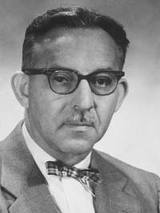
Dr. Lester Adelson, 1960s
Lester Adelson, the former chief deputy coroner of Cuyahoga County, was fun and morbid. He said he wanted to write a book called My Life is Death. He said he missed ice picks. “Nothing against frost-free refrigerators,” he said. “But back when people went at it with sharp objects, they could generally be stitched back together again.”*
He was at the coroner’s office 37 years.
Adelson said to me, “The only violent natural death is lightning, you follow?”
I didn’t.
He said lightning — the electric charge — zaps you immediately. You die by “lightning.” If you drown or get hit by a tornado, you don’t die by “tornado” or “drowning.” You die of more arcane causes.
Adelson said, “I don’t remember my mother’s labor pains, but you’re born in someone else’s pain — your mother’s — and you die in your own.”
He liked to quote Shakespeare.
Coroner / Shakespeare / bowtie / Harvard grad / Jew.
Interesting.
Dr. Lester Adelson. He even wrote an article for the New England Journal of Medicine (Feb. 4, 1960) about the various deaths in Hamlet. Claudius poured poison into the ear of Hamlet’s father.
Adelson wrote: “When one considers the sensitivity of the human ear, including the external auditory canal and the eardrum, it appears difficult to accept the proposition that a drug can be poured into the ear of a sleeper without arousing him, as the Ghost asks one to believe.”
“If the elder Hamlet’s eardrum had been perforated . . . ”
Adelson retired from the coroner’s office in 1987. He died at 91 in 2006.
—–
*from a Plain Dealer editorial, 3/20/06.
—
“No More Greasy Fries,” the vid:
—-
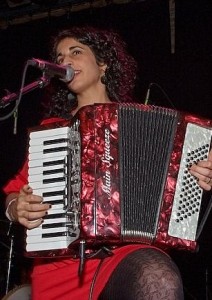
Annette Ezekiel Kogan, Golem bandleader
The Workmen’s Circle annual free Yiddish concert is 7:30 p.m Sunday (June 23) at Cain Park, Cleveland Heights. Golem performs. No tickets necessary. Simply show up.
June 19, 2013 3 Comments
COOL WORLD
1. CLEVELAND 1975
I wore red Adidas tennis shoes to an audition for a soul band at E. 91st Street and Union Avenue.
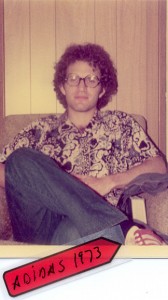 The bandleader, Amos, liked my shoe color and my skin color. He said, “Ain’t no Holiday Inn going to hire no band without a white guy, and right now there ain’t nary a grain of salt in this room.”
The bandleader, Amos, liked my shoe color and my skin color. He said, “Ain’t no Holiday Inn going to hire no band without a white guy, and right now there ain’t nary a grain of salt in this room.”
I wasn’t too good on sax and harmonica, but I got the job.
Amos thought harmonica was corn pone, not a respectable axe for a black man, but it was OK for a white. He said, “We can use that harp. You hip to Tower of Power? They got a bad white dude on harp. You hip to War? Another bad brother of yours on harp.”
The keyboard player had doubts — not just about my playing. He didn’t like Amos’ pot smoking.
The keyboard player broke up the band a few weeks later. He said. “Weed is communicating with the demon.”
“What you think?” Amos said. “What you gonna do when we play cabarets and shit? It ain’t no motherfucking church!”
“I said, I quit.”
Regardless of the church/cabaret conflict, we would have broken up. At our next rehearsal, Amos’ son was on drums, then a woman drummer sat in. The other horn player — an old guy, about 40 — had no teeth. He said, “I can’t play without my choppers.” But he could play. He played bebop.
Amos wanted to try gut bucket blues, even country western. “I’m unemployed! I’ll try anything,” he said.
I stopped by the Hibachi Lounge at Union Avenue and E. 103rd Street, where we were scheduled to play. The bouncer wore a red jump suit and a red wide-brim hat; he shuckled (davened) at the pay phone like he was listening to Dial-A-Jewish-Concept. Several women line-danced to the jukebox.
The women stopped dancing when they saw me.
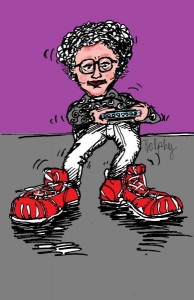
What's happnin', ladies?
Was I cool?
Ask the women. I got out of there.
2. DETROIT 2002
Yiddishe Cup shared the bandstand with a soul band at a fancy wedding. I asked the soul singer if she had seen the documentary Standing in the Shadows of Motown, which had just come out. She said her father, pianist Johnny Griffith, was in it.
The tenor player said, “The movie didn’t feature the horn players. It should have.”
The tenor player tuned up. He sounded better than most Yiddishe Cup jazz solos.
The tenor player liked our klezmer stuff, particularly our “Araber Tantz.” “What kind of scale is that?” he asked.
“In Yiddish it’s called freygish,” I said. (Freygish is the “Hava Nagila” scale: E F G# A B C D E.) “It has a flatted second and a 1½-step leap from the second to the raised third.”
“Very cool,” he said.
About time.
—
Public service announcement.
For all you readers down in Wayne County (Wooster), Ohio.
From Ellen Pill:
Re Don’t Buy From the Jew! A History of Jews in Wayne County, Ohio — 1840-1950.
We are writing a book and looking for any information on early Jewish settlers in Wayne County and surrounding areas: photos; newspaper clippings; personal information; and especially, anecdotes about daily life. Contact Ed Abramson: 330.345.5350 or Ellen Pill: ellenfpill@gmail.com
[Editorial comment from Bert Stratton: Don’t Buy from the Jew. Harsh! My grandfather Albert Zalk ran a “Jew store” in Yazoo City, Mississippi. They liked him down in the Delta. My wife’s grandfather George Rosen ran a “Jew store” in Clarksburg, West Virginia. I was there a few times. The town loved the Rosens.]
June 12, 2013 4 Comments
I HAD AN AFFAIR
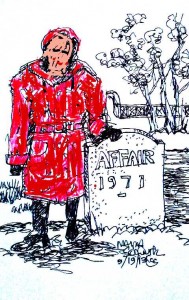 I’m waiting for the guy I had an affair with to die. He’s 78 and kind of well-known.
I’m waiting for the guy I had an affair with to die. He’s 78 and kind of well-known.
I wore a red “wet look” vinyl coat to his English Lit class. This was quite a few years ago. The other girls wore rags I wouldn’t even wear to paint in. I’ve always been fashionable.
I was a pretty good student. I wrote a Chaucer paper about the miller — or somebody, I can’t remember – maybe the pardoner. I compared the pardoner to the then-omnipresent countercultural huckster, such as the Columbia Records pitchman: “But The Man can’t bust our music.”
The professor called me into his office and said, “I want to see more work like that!” He had a Ph.D. and a couple books out. He paid attention to li’l ol’ me.
We walked across campus. We got ice cream. I got the hairy eyeball from girls — and guys — my age. Awkward.
The prof lived in the suburbs. I was at his house only once, when his wife was out of town. He had a bedroom dedicated to just books, and me apparently.
The prof was fascinated by the “youth culture.” He thought I could help him on that count. Wrong. I was a high school English-teacher manqué, not a rabble-rousing hippie. He didn’t even know what “make out” meant. He would say “How you making out?” in his class, and kids would giggle. It’s like today when kids say “hooking up” and we don’t know what the kids are talking about.
The prof once asked me, “Have you ever taken pot?” Taken pot? Also, he didn’t know what hash was.
We talked by phone every night after midnight. Pre-cellphones.
The prof and I had our liaisons at the house of a professor who was on sabbatical in California.
I just Googled the prof . . .
Holy shit, he’s still teaching! He’s on Rate Your Professor. Some students like his lectures; some say he rambles. One alum writes: “I took his course 41 years ago and still remember his comments on my papers. I write for TV now; both his entertaining insights and his honest assessment of good and bad in my sophomoric work help me earn a living.”
Maybe I’ll rate my prof.
No, let’s leave this unrated.
—
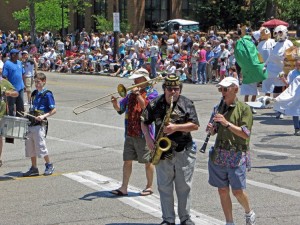
Yiddishe Cup, 2012, Parade the Circle
Yiddishe Cup plays Parade the Circle noon Saturday (June 8) at Wade Oval, University Circle, Cleveland.
June 5, 2013 3 Comments
JEWS AND THE ART
OF MOTORCYCLE MAINTENANCE
Shul Guys is a Jewish motorcycle club in Cleveland. What kind of name is Shul Guys? A wussy, disgraceful name.
There is a Jewish club called Hillel’s Angels. Better.
My friend Ralph Solonitz is the leader of the Vilde Chayas (Wild Animals). I think it’s just him.
The mayor of Beachwood, a Jew, belongs to a motorcycle club that hangs out at the Chagrin Falls Popcorn Shop. Some of the guys in the mayor’s club ride trikes. That’s not motorcycling, that’s day care.
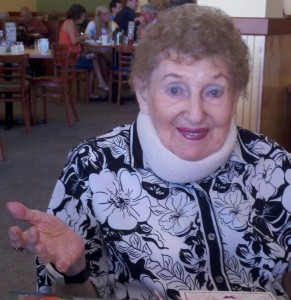
Bertha Solonitz, 2012
Ralph has long hair, a leather jacket and black boots. He’s a 100% kosher hog (and this blog’s illustrator).
Ralph’s mother, Bertha, is a big fan of Yiddishe Cup. She follows the band around, or vice versa. I said hi to her at a Holocaust survivors’ luncheon, and she said, “You know who I am!”
“Yes, your son is a great artist!” I said. Maybe that’s why she follows the band around.
Mrs. Solonitz is from Lithuania. Ralph’s father, Julian, was from Lithuania, as well. Ralph’s father grew up in Vilna, now in Lithuania, though for a long time in Poland. Mr. Solonitz fought in the Polish army (part of the Soviet army) during World War II.
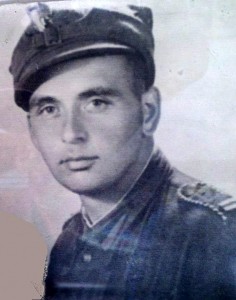
Julian Solonitz, 1946
Maybe Ralph rides his motorcycle and wears the leather gear because he hasn’t liberated anybody lately, like his dad did. Ralph’s father was with the army unit that liberated Majdanek concentration camp.
Maybe Ralph has freed somebody and not told me. Ralph should take his motorcycle out to Vrooman Road and liberate the Slovenians in Lake County.
The Cleveland Jewish News periodically runs stories about Jewish motorcycle clubs. It’s an easy story to write. Just name-drop: Shalom n’ Chrome from South Carolina, the HawkChais from Iowa. Harley, Son of David is a Canadian documentary that used two tracks from a Yiddishe Cup recording.
Consider joining the Vilde Chayas. Ralph needs company. And you get this jacket:
May 29, 2013 5 Comments
COPS
Sam and Frank — Cleveland cops — grew up on E. 79th Street and St. Clair Avenue.
Sam said, “I’m going to have a silver wedding anniversary and invite my three ex-wives.”
Frank said, “If you and the commander — plus your exes — get together, you’ll need the FOP Hall.”
Frank said, “I remember when you were an old man.” (Frank was 37; Sam, 47.)
Sam said, “I’ve got 1139 days left.”
Frank said, “We’ve got to make you a short-timer’s calendar. I had one in the service with the finger on it.”
Sam and Frank, on a drug sweep, rolled down St. Clair Avenue, Collinwood, in a junker at 1 a.m.
Sam said, “Where did we get this piece-of-shit car?”
Frank said, “Mentor.”
“Where in Mentor?
“At the flea market.”
“Right.”
At Pepper Avenue and 140th Street, Sam said, “He’s moving. That car is moving. Let’s catch him dirty while he’s rolling.”
Sam threw the guy up against the car hood. He was dirty; he had a joint on him.
Frank said, “Let him go. Let’s go to Mandalay [playground] and get some white guys.”
—
SIDE B
Here is the annual “inside baseball” post. Your name might be in here . . .
BLURTS
We interrupt this blog to tell you this blog is four years old.
First off, thanks to the major comment writers.
In no particular order, thanks to Marc, Jessica, Gerald Ross, Seth, Gerry Kanter, Ted, Adrianne Greenbaum, Bill Jones, Mark Schilling . . .
David, Irwin Weinberger, Jack, Don Friedman, Alice, Ken Goldberg, Steven Greenman . . .
Charlie B, Ben Cohen, David Korn, Jack Valancy, Ari Davidow and B Katz . . .
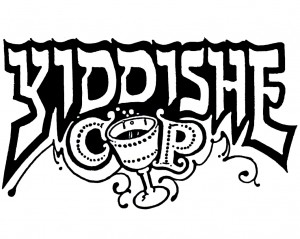 Special thanks to Ralph Solonitz. I encourage him to draw as many pics as possible. Works out well. I met Ralph about 22 years ago when he designed Yiddishe Cup’s logo. That’s still your best logo, Ralph.
Special thanks to Ralph Solonitz. I encourage him to draw as many pics as possible. Works out well. I met Ralph about 22 years ago when he designed Yiddishe Cup’s logo. That’s still your best logo, Ralph.
I have an essay, “Renting the American Dream,” in the latest City Journal, which will be online soon. Also, CoolCleveland.com runs Klezmer Guy blurts regularly. Here’s a blurt (Carma) from today’s CoolCle. My older son left his car at the Rapid Transit parking lot for two months. Check the story out. It’s funny.
Please see the “categories” listing on the right side of this blog. I recently added a new category, 13 BEST POSTS, as judged by me.
“Categories” is also a good place to read 78 posts in a row about real estate. Spend a couple weeks reading archived posts!
No doubt I could increase my comments tally by writing “thanks” or “hi” after every comment. But I have standards.
And they are low. When I stumble upon a new blog, I immediately read the posts with the most comments and feel guilty about that.
The bell rings, round five.
—
I wrote Carma for today’s CoolClevelandcom e-blast.
May 15, 2013 No Comments
CARMA
My son Ted parked his car at the Brookpark RTA lot and flew to Las Vegas. The RTA lot was cheaper than the airport lot.
My son didn’t come back. He thought he was going for a vacation, but he got a job in Las Vegas and stayed there.
My son’s 2007 Ford Focus sat in the Brookpark lot for two months, until my wife, Alice, and I loaded our car with jumper cables and a generator-pump and drove to the RTA lot, which is next to Ford Engine Plant #1 and a couple strip bars.
I said to Alice, “Ted’s car is technically in Brook Park, not Cleveland. That’s good. If the car has been towed or stolen, we can deal with Brook Park red tape better than Cleveland red tape.”
The car wasn’t towed or stolen. It was there. The doors were unlocked. The tires were low. There was a bottle of bourbon in the backseat.
I drove Ted’s car to the Lusty Wrench in Cleveland Heights the next day. Sam, the mechanic, said, “The car is basically in good shape with 89,000 miles. The battery will not make it, and as you know the side-view mirror is taped on. The tape is not a bad solution. The rear tires are round, black and hold air, but they’re not very good.”
The car was serviceable. It worked.
I want to know, Is Greater Cleveland really this safe and accommodating? I need more data. Please leave your car for two months at a Rapid stop and tell me what happens.
May 8, 2013 No Comments
SEIGER’S RESTAURANT
The cops at the Sixth District police station in Cleveland considered me a hippie spy from the Heights. But when I told the cops I was a Seiger (“My uncle owned Seiger’s Restaurant on E.118th and Kinsman”), the cops warmed up to me. The cops — the older ones, the bosses — all knew Seiger’s Restaurant.
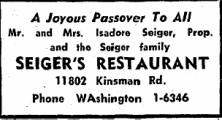
Cleveland Jewish News, 1968
Seiger’s Restaurant was a Damon Runyon casting hall on Kinsman Road. All manner of hustlers, cops, businessmen and shnorers (beggars) hung out there. The shnorers were Orthodox Jewish tzedakah (charity) collectors who had their own booth in the back.
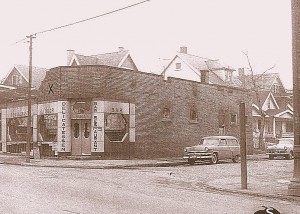
Seiger’s, 11802 Kinsman Rd., 1957
My Great Aunt Lil Seiger served the shnorers kosher food from her apartment, which was at the back of the store. The shnorers wouldn’t eat the non-kosher food from the restaurant. The deli was kosher-style, not kosher. “We served the rabonim [the rabbis] on special china and silverware, milchig [dairy]’,” Lil’s son Danny said.
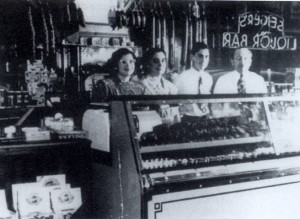
Seigers: Audrey (daughter), Lil, Danny (son) and Itchy, 1948
Rabonim — and cops — ate well at Seiger’s. Nobody ever got a ticket for an expired parking meter, and sometimes cars were parked two-lanes deep on Kinsman. “I couldn’t even spend a nickel in Seiger’s,” retired cop Bill Tofant said.
Itchy Seiger, my great uncle, was the owner and chief kibitzer (glad-handler/talker). He had been a cloak maker in Galicia, Austria-Hungary. Itchy was the greeter. Aunt Lil did the cooking, except the breads and strudels, which she bought.
There was a party room, seating about 65, in the basement. The matchbooks read: “Seiger’s Restaurant, Delicatessen, Barroom and Rathskeller.”
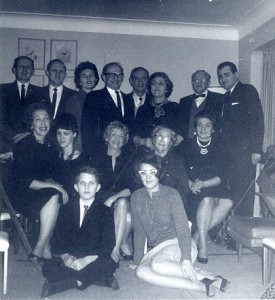
Danny and Itchy Seiger, back row, from R. Shiva for Anna Soltzberg, South Euclid, Ohio, 1964
I didn’t go to Seiger’s Restaurant often. My parents didn’t think Kinsman was the right direction for a Sunday drive. More often we wound up out east — the other direction — at the Metroparks.
Danny — my cousin — started showing up at Yiddishe Cup gigs in the 2000s. I asked him about the mini-feud between his father (my Uncle Itchy) and my grandmother, Anna Soltzberg (nee Seiger). Itchy and Anna had been half-siblings. (Enough with the genealogy, Klezmer Guy!) Danny said Itchy and Anna had had two things in common: sugar diabetes and iron wills.
My grandmother’s candy store — near Itchy’s deli on Kinsman — had frequently been “oyf tsoris” (badly off), and Itchy rescued it, Danny said.
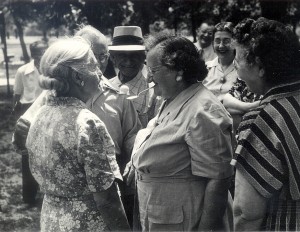
Anna Soltzberg, center, 1950s. Others unknown
“Everybody loved Itchy,” Danny said. Everybody but my grandmother, who complained about Itchy’s buy-out terms on her store. Later, my grandmother opened a candy store further east on Kinsman, near Shaker Heights.
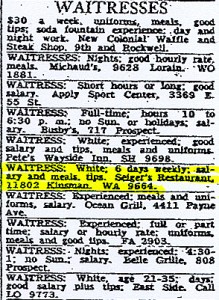
Cleveland Plain Dealer , 1947
“At the restaurant, there were two brothers, the Schoolers,” Danny said. “One, Joe, wanted a soft matzo ball. The other, Morty, wanted a matzo ball as hard as a baseball. Ma made both kinds. That’s how we thrived.”
Somebody should take Danny, age 80, and a video camera for a stroll down Kinsman. Walk Danny through the old neighborhood and into Seiger’s, which was recently a soul food restaurant. (Today it’s boarded up.)
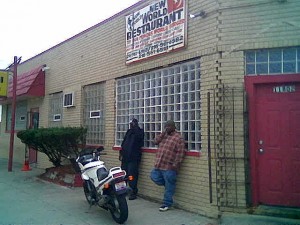
New World Restaurant, formerly Seiger’s, 2010.
The audio,
Danny: “This is where Ma made the mish-mash soup. She gave the recipe to Corky & Lenny’s. This is the counter where Jim Brown bounced a $10 check. I should have saved it for the autograph. This is where Oscar Schmaltz downed an industrial canister of soup. Oscar weighed 400.”
—
Footnote: Seiger’s is pronounced Sigh-ger’s (rhymes with High-gers) by Jews, and See-ger’s by cops. Seiger’s closed in 1968.
—
For relatives only . . . family photo above, taken at the shiva for Toby Stratton’s mother, Anna Soltzberg.
On floor, from L: Bert Stratton, sister Leslie.
Middle: Aunt Lil Soltzberg of Washington; Janice Bregman (wife of Marc Bregman); Aunt Pearl Bregman; Great Aunt Molly Mittman; Marcia Seiger.
Top: Uncle Milty Soltzberg, Toby Stratton, Julia Stratton, Uncle Sol Soltzberg, Great Uncle Sam Mittman, Aunt Lil Soltzberg of Delaware, Great Uncle Itchy Seiger, Danny Seiger.
(Sol Soltzberg, Milty Soltzberg, Pearl Bregman and Toby Stratton were siblings.) Marc Bregman — the son of Pearl Bregman — probably took this photo.
May 8, 2013 12 Comments
THE HEYMISH AND THE AMISH
I live near two large Amish settlements — Middlefield, Ohio and Holmes County, Ohio. I know some of the differences between the various Amish sects. Some Amish use battery-powered lights on their buggies. Some don’t. Some use the triangular orange “slow vehicle” sign, some don’t.
 Speaking of guys-in-black, I also know some very frum Orthodox Jews. I know what the crocheted yarmulke means versus the black hat.
Speaking of guys-in-black, I also know some very frum Orthodox Jews. I know what the crocheted yarmulke means versus the black hat.
I’ve only been around Amish and Jews once. I saw an Amish man in the lobby of Green Road Synagogue — an Orthodox synagogue in Cleveland. I said to myself, “I’m wrong.”
This “Amish“ guy was probably a hipster Jew trying to look Amish, with a wide-brim hat, beard, no mustache and a vest. Like Solzhenitsyn.
I saw 15 Amish women in blue dresses and white bonnets come out of the kitchen. They carried parfaits on trays.
Then I saw a horse and buggy at the side door. (How does a horse and buggy get to suburban Beachwood? By truck.)
Solzhenitsyn stacked bales of hay in the temple lobby and brought in chickens. He was John, an Amish from Middlefield, and he worked for an Orthodox Jew who owned a mattress factory and was hosting a sheva brochas (post-wedding dinner). Yiddishe Cup played the dinner. We played our usual repertoire of Yiddish, Hebrew and klezmer. I asked the Amish buggy driver what he thought of the music. He said, “It sounds like Mozart.” Maybe because of the violin?
The man stacking the hay said some Amish in Ohio play harmonica — the 10-hole diatonic model. “That’s all, for instruments,” he said. “Other instruments [like flute, guitar] might lead to forming a band.” A Jewish joke?
The rabbi jokingly asked if Yiddishe Cup knew any Amish songs. We tried “Amazing Grace.” Probably a first for Green Road Synagogue. The Amish liked the song. We also played a Yiddish vocal, “Di Grine Kusine” (The Greenhorn Cousin), which the Amish didn’t seem to go for. I thought they would like our Yiddish repertoire, since the Amish speak Pennsylvania Dutch.
Now I know: go easy on the Yiddish at Amish-Jewish parties.

Alan Douglass, Yiddishe Cup’s keyboard player, Green Road Synagogue, 2011
—-
The Klezmer Guy trio plays Nighttown, Cleveland Hts., 7 p.m. Tues., April 23. $10. Play it safe and make a res: 216-795-0550.
An evening of social commentary, plumbing tips, and song. As if Garrison Keillor was raised on pastrami.
Alan Douglass, piano and vocals; Bert Stratton, clarinet and prose; Tamar Gray, vocals . . .
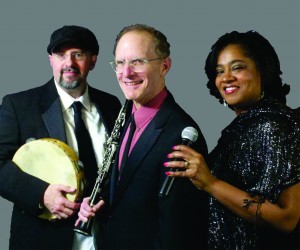
—
Next week “Klezmer Guy” posts up on Tuesday (April 23) instead of Wednesday. Just so I can remind you one more time about the April 23 Nighttown gig.
—
Mazel Tov to Sen. Jack Stratton (I-Calif.) for reaching his goal on Kickstarter. His band, Vulfpeck, hit the mark today.
Jack the Tummler . . .
April 17, 2013 1 Comment
RAT-AND-MOUSE GAME
Brittany, a tenant, said she saw five rats in her kitchen. She hightailed it to her parents’ house in Sandusky, Ohio, and called me. “I’m tired,” she said. “I have to drive in from Sandusky now every day for work.”
“You saw five rats at once?” I said.
“Yes. Your custodian said they were rats,” she said.
“They were probably mice,” I said. I also told her to take $200 off her rent, and we would bring in a professional exterminator.
She said the rats crawled in her bed.
I paid the exterminator $102. He sealed the apartment with caulk and put in mouse traps that looked like miniature tinted-glass limos. Mice crawled into the limos and died. The mice were ready for the mouse funeral parlor.
Brittany showed me a cell phone pic, taken in her kitchen, of a dead rat.
I said, “Mouse.”
“That’s a rat,” she said.
I’ve seen maybe 50 trapped mice and two trapped rats. Rats are much bigger than mice. Rats rip things up. They’re like raccoons in your kitchen. Rats rip bags to shreds. Rats eat through concrete.
“You had a mouse,” I said.
“Rats.”
“Please don’t say rats,” I said.
“OK, rodents.”
Yes! Success.
She moved out.
Rats.
***
Drug Mart has a new mouse trap with an extra-wide feeding plate. I’m not sure it’s a better mouse trap; I haven’t bought one.
My favorite traps are traditional spring-loaded Victors, from Lititz, Pennsylvania.
Drug Mart was out of Victors. I got the Chinese knock-offs. The instructions on the Chinese traps read: Ne pas mettre les doigts dans la trappe. Drug Mart must have gotten the traps from a Canadian buyout. Recommended bait: fromage, saucisson, jambon, beurre de cachuetes. I figured all that out, except saucisson.
I looked up saucisson: French hard salami.
Mice live well in Canada.
I don’t blame my tenant, Brittany, for moving out. A rodent — a mouse or rat –- crawling in your bed is serious. Rodents should stay in the kitchen, where they belong.
—
SIDE B
This will take your mind off rats.
MURKY
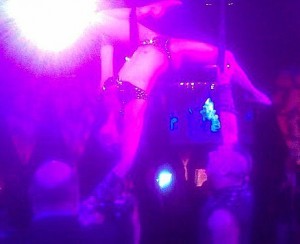
A Yiddishe Cup musician sent this pic from a gig to his friends. (My sidemen are always taking pictures.)
The pic was murky and scary. The musician captioned the photo: “Wildest gig ever. Upside-down acrobat pouring champagne for the guests.”
Another musician – not at the gig – wrote back: “Wild Gig? What did I miss!”
The absent musician missed the upside-down acrobat. Compared to a bar mitzvah, it was a wild gig.
The event was a fundraiser for a community college.
Not salacious enough for you. Right.
—-
Yiddishe Cup plays 6:15-7:45 p.m Mon., April 15, at Landerhaven for Cleveland’s community-wide Yom Ha’atzmaut celebration. Free. David Broza is on at 8 p.m.
—
The Klezmer Guy trio plays 7 p.m. Tues., April 23, at Nighttown, Cleveland Hts. $10. More info here.

Alan Douglass (L), Bert Stratton, Tamar Gray. (Photo by Ralph Solonitz)
April 10, 2013 1 Comment
STYLIN’
I was somewhat stylish in seventh and eight grades. I shopped at Mister Jr.’s and Skall’s Men’s Wear at Cedar Center shopping center. After eighth grade, I gave up. I couldn’t cut it — shopping and fashion.
My dad had a friend who sold the Farah pants line in Cleveland. I liked Farah, but Farah wasn’t fashionable. Nice feel, but not too cool. Lee –- the brand — was cool. Farah was part of the Continental look — the greaser look. Iridescent sharkskin.
Italians clung to the Continental look for years. Jews got out of it quickly and moved to the “collegiate” look — Lee’s. Like colored jeans. This hurt Farah.
Ben Skall, an old guy, owned Skall’s Men’s Wear. He became a state senator. I had to give up white socks to enter Skall’s world; I bought black socks with gray rings around the top (Adler brand).
Sam McDowell and Hawk Harrelson shopped at Skall’s.
I didn’t quite make the in-crowd at school. I made the in-between crowd. My problem (one of them): I came from a hick elementary school –- a place with plenty shark-skinned Italians and few Jews. When I arrived at junior high, I noticed right off half the school was yiddlach, and these kids were by and large “fast,” and they could dress, and they could “mock you out” if you dressed wrong. I had no idea what to wear! I had a spread-shirt collar. That was verboten. It had to be button down. I went to Skall’s.
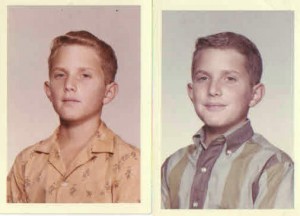
Wrong (L) / Right (R). Bert Stratton, early 1960s
I wore a fisherman’s knit sweater my mom made. Homemade was verboten too, but a girl complimented me, so I kept wearing the sweater. “Nice sweater,” she said. (If she had said “Nice sweater” — accent on the “nice” — that would have been a putdown.) Home run. Thanks, Mom.
I bought a shirt jac and light blue denim pants. The shirt jac didn’t tuck in.
Shoes: Pedwin loafers — black, cordovan, or olive green. Choose one. Cordovan was M.O.R. (middle of the road).
I bought Levi’s – not Lee – jeans. Cream-colored. Not blue jeans. Blue jeans weren’t permitted at my junior high.
The rules about clothes and fashion confounded me for several years. For instance, shirts could have box patterns, but not big boxes. If you wore a box pattern the size of a checker board, you were dead. I avoided box patterns and wore striped shirts — always appropriate.
One more thing . . . sweaters: Alpaca was the anchor of the Continental look. Alpaca sweaters were itchy and very Italian. The comfy V-neck sweater was the collegiate look. I had a gold V-neck called Summer Wheat. (Like my cereal, which is Autumn Wheat.)
I dropped out of the fashion whirl about ninth grade. I hung out mostly with nerds. “Nerds” wasn’t even a word. Neither was “geek.”
Dufuses? Dips? We were anti-social and afraid of girls. We were hopeless, so why shop?
This is ancient history.
What about knickers?
—
Footnote: Greasers were called “racks” at my school. Derived from “racketeers,” I think.
Click here for more on the guys I went to school with [a Klezmer Guy rerun, from 11/30/11].
And please read the info below this illustration. 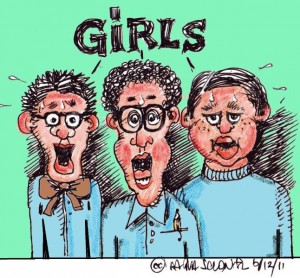

Tamar Gray
The Klezmer Guy trio plays Nighttown, Cleveland Hts., 7 p.m. Tues., April 23. $10.
Alan Douglass, keyboard and vocals, Bert Stratton, clarinet and prose; and Tamar Gray, mostly singing Motown vocals.
Tamar Gray’s uncle is Slide Hampton, the jazz trombone player. Tamar’s brother is Pharez Whitted, a Chicago jazz trumpeter. Tamar’s mother was part of the Hampton Sisters of Indiana. In other words, Tamar has yikhes (musical lineage).
—
Speaking of yikhes (and nepotism), Jack Stratton is 75% of the way toward reaching his latest Kickstarter goal. Check out his Kickstarter project here. It’s about Vulfpeck, Jack’s German-Jewish band.
April 3, 2013 4 Comments
A ROUGH REVIEW OF
YIDDISHE CUP
Yiddishe Cup calls its act “neo-Borscht Belt klezmer comedy.” That’s been done before — the Borscht Belt schtick. For starters, about 60 years ago.
Yiddishe Cup can fill a golden age center in Miami. Then what? Take it on the road to the Bronx Hebrew Home for the Aged. Then return to Miami and stay there. And don’t forget your meds, guys. You’re not getting any younger.
Has Yiddishe Cup ever toured for weeks, developing a solid groove, establishing decent ensemble chops?
No.
On weekends the band collects inflatable guitars at bar mitzvahs, eats baked salmon, and watches “reflections” videos.
Does Yiddishe Cup research old Yiddish tunes at YIVO? Does anybody in Yiddishe Cup know where YIVO is? [New York.] Or what YIVO means? Does anybody? [Yidisher Visnshaftlekher Institut.]
One more thing: dynamics. Ever heard that word, Yiddishe Cup?
—–
Klez bandleaders, please submit your recordings for review here. You have nothing to gain.
—
SIDE B
This post is a rerun (from 4/20/11). No, I’m not running out of material. I just like this one. Happy Passover.
NOT A PASSOVER STORY
Bialy’s Bagels in University Heights, Ohio, was my bagel supplier for years. I would go swimming; go to Bialy’s and buy 15 bagels; eat two; drive to my mother’s; give her three; and take the rest home.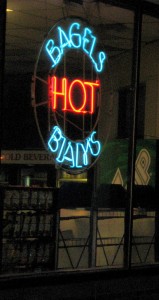
I was on a bagel diet. I thought eating sesame and poppy seed bagels was a smart weight-control maneuver.
My back-up bagel purveyor was Amster’s at Cedar Center. The counter woman there, Marilyn Weiss, volunteered for school levies, racial integration projects, and did a ton of schlep work at my shul. Amster’s was all about Marilyn’s personality. Unfortunately she died in 2000, and the place closed a few years later.
I also went to Better — as in “Better Bagel” — on Taylor Road. The owners were New Yorkers who wore yarmulkes and Brooklyn Dodgers shirts. I figured they knew bagels.
They didn’t. Their bagels were too doughy and not crispy enough on the outside. Better Bagel eventually changed its name to Brooklyn Bagel.
No better.
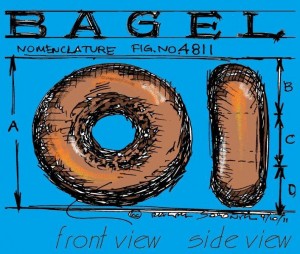
Go to Bialy’s. If Bialy’s ever closes, we’re in bagel trouble in Cleveland.
March 27, 2013 7 Comments
I HAVE A CRIMINAL RECORD
I was out of my skull. I broke into boxcars and unloaded Cutty Sark, golf balls and tires. On a bad night, tennis shoes.
I had tin snips that cut right through corrugated steel roofs.
This was several years ago. Now I’m retired and live a fairly quiet life. I’d rather not say where.
I belong to no clubs and don’t go out. I watch sports on TV. I have an intense appetite for the Browns, Indians, sausage and hash browns.
I never got married. I should have. There was this gal in the 1970s — Roz Falk. She loved me, but I wasn’t ready. I was 45. Schmuck! Me.
I was in the Marines. A lot of people don’t know that. I couldn’t stand it. I was in for six months. Semper Fidelis was plain bullshit to me. Latin bullshit.
You ever notice how Italians use that kind of bullshit language? It’s very big with them. If you’re Italian, you’re better than the next guy. You can be the biggest, dumbest fuck on two feet, but if you’re Italian, you’re it.
I have enough spaghetti and wine in my veins to be Italian. Believe it. And the goddamn hot peppers, I can eat a whole mason jar full.
Funny, I grew up in a deli — a Jewish deli — on Kinsman in Cleveland. I remember the pickles best. The cukes were right in the goddamn basement. They were delicious. And the goddamn gherkins . . .
My family disowned me after Marion. A nice Jewish boy in the joint. Not exactly kosher. I did three years in Marion, then eight in Chillicothe. I haven’t talked to any relatives in, I bet, 30 years.
When I got out — the last time — I made a clean slate of things. I sold stained glass to restaurants. Completely legit. I didn’t like it.
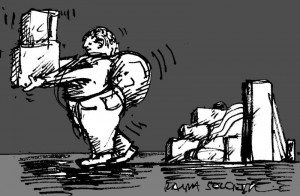 I went back to stealing. The hardest part was carrying the loot. I was that good.
I went back to stealing. The hardest part was carrying the loot. I was that good.
I never killed nobody. I…did…not. I was an accomplice, yes that’s true, but I never killed nobody. The chickenshits from Murray Hill, they did. They didn’t have my abilities. I did everything that took a brain, and they stood around with their hands in their pockets, except when it came to guns.
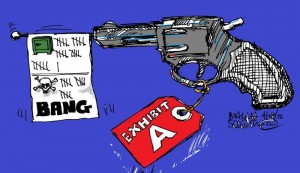 It’s all a head game — crime. Keep your mouth shut and show your intelligence, and you’ll be fine. It has worked for me most of the time.
It’s all a head game — crime. Keep your mouth shut and show your intelligence, and you’ll be fine. It has worked for me most of the time.
I’m paranoid. That has saved me — being paranoid. Sometimes you know a place is a death trap. It’s all trial and error.
My biggest mistake . . . You know? Quitting high school. I thought I knew more than the teachers. Schmuck! Again. I could have been an engineer.
I hung with the older boys who ran a stolen butter and cigarette ring on Woodland. An old fat Jew — the Eggman — was in charge. I rigged him up a walkie-talkie.
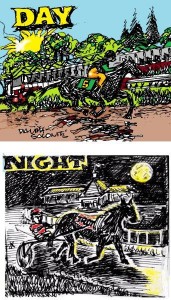 I don’t have a dime anymore. I spent everything I ever earned. I blew it all on cards, broads and racehorses — owning horses. I couldn’t deal with the thickheaded Italians at the racetrack, so I got out, but not before I was broke.
I don’t have a dime anymore. I spent everything I ever earned. I blew it all on cards, broads and racehorses — owning horses. I couldn’t deal with the thickheaded Italians at the racetrack, so I got out, but not before I was broke.
I eat wieners and Coke. Love that combo. I remember when I pinched three cases of sausage from Red Barn. I didn’t fence it. I ate it all.
I’m in menopause — male menopause. I’m 79. The docs talk about that on TV.
I love my TV set. It don’t talk back to me. Perfect.
I ain’t got nobody, just my TV.
I do have a record . . .
NAME: JOSEPH A. MOSKOWITZ
ALIAS/NICKNAME: JOE MOSCOW
DOB: 12-11-1933
FACIAL ODDIITES: UNK
FACIAL HAIR: GOATEE
SPEECH: POLITE
COMPLEXION: MED
MISSING BODY PARTS: UNK
GENERAL APPEARANCE: UNKEMPT
TEETH: UNK
SCAR/BIRTHMARK/MOLE: UNK
TATTOO: UNK
WT: 305
HGT: 5-8
ADDRESS: UNK
CONVIC: MANSLAUGHTER, AGGRAV BURGLARY, LARCENY, KIDNAPPING, CRIMINAL TOOLS, GRAND LARCENY
—
This is the latest in a series of fake profiles. (Cyberspace needs them!)
—
Jack Stratton’s latest Kickstarter campaign is up. Something about a half-Jewish German-American band, Vulfpeck. The Kickstarter staff — as well as Bandcamp people — picked the project as a fav. Check it out here.
March 20, 2013 5 Comments
HUMOUR ME
My friend Rob, a social worker, was fixated on Canada. He watched “Hockey Night in Canada” on TV and studied the Canadian railroad timetables. He filled out immigration papers to Canada, waited several months for clearance, and moved to a small town in Ontario.
The next day he came back to Cleveland. He was a mama’s boy, I figured.
He didn’t like the social work job, he said, but he liked Canada.
Rob definitely didn’t like Cleveland — the blasting car horns, the boom boxes, the leaf blowers, and his parents pestering him. One day Rob’s father said, “You’re going to move too far away.” The next day his dad said, “You need to go out into the world and prove yourself.”
I subscribed to “Hockey Night in Canada” for Rob, so he would babysit my then-toddler son for free on Saturday nights.
Rob moved to Canada again. This time to Nova Scotia. Change your place, change your luck, as the Hebrews sages say.
It worked. I haven’t seen Rob in 18 years.
I miss him, even though he verbally abused me. He was misanthropic. He was jaded. No, I was jaded. We held jadedness contests. Rob said I was restaurateur on a perpetual hunt for dishes my bubbe never made.
He said, “You crave urban experience so badly you would eat flankn cooked directly off the seat of a cross-town bus.”
True enough. So would he.
Rob and I listened to comedy records, played music together, and made fun of Jews. Rob knew more Yiddish than I did back then. His favorite curse was Gey mit dayn kup in drerd. (Go to hell. Lit., go with your head in the ground.)
We attended High Holidays at Case Western University Hillel. I had to drive; Rob was anti-car, anti-noise. He was so sensitive — probably the most sensitive person I’ve met, and that includes Harvey Pekar, who was not exactly loosey goosey on the avenue.
I schlepped Rob to a hillbilly bar on the near West Side, so he could jam with the house band. He played guitar and sang a couple tunes. Rob was devoted to country music — authentic country. Rob’s favorite player was Hank Williams.

Lake Erie gets you there: Canada. 57 miles. (Cleveland shore, Feb. 2013)
Rob made his sole East Side musical appearance at Heinen’s supermarket for a cancer-awareness fundraiser. He played “Good Old Mountain Dew” in the pop section and “Hava Nagila” by the oranges. He had a sense of place.
And he moved to Canada.
I wonder what he’s up to. He has family in Cleveland. He visits here, I imagine.
Rob doesn’t call. He doesn’t write. He doesn’t humour me.
—
“Rob” is a pseudonym.
—
At CoolCleveland.com today, “The Kid from Cleveland.” About a “kid” I ran into in Atlanta.
—
Extreme Canada is England. Here’s a video about England. (A Klezmer Guy rerun.)
March 13, 2013 No Comments
THE COOLEST GUY
IN YIDDISHE CUP
Yiddishe Cup’s drummer, Don Friedman, also goes by the name Donny Mann (as in “Shelly Manne” and “Herbie Mann” — fellow yids).
“Donny Mann” started back in pre-history — the 1970s. “Jan Paderewski gave me the name when we were playing five nights a week at the Blue Fox Restaurant in 1974,” Don said. “Talk about wiseguys. It was all Mafia guys at the bar.”
“Jan Paderewski?” I said.
“Yes. His parents were musicians. They played a lot in Little Italy.”
Jan Paderewski’s great, great uncle was the Jan Paderewski, the renowned Polish pianist and statesman. Jan Paderewski of Cleveland was a stand-up comedian, restaurant owner and pianist. He played light classical and standards. Jan Paderewski of Cleveland died in 2000.
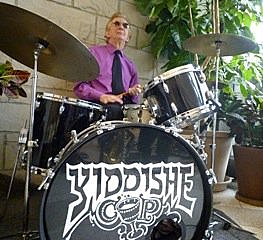
"Donny Mann" 2011
Donny Mann attended Berklee in 1961, when Berklee was just one building with a couple hundred students. Donny dropped out. Back then that was the idea: drop out and play gigs. Still is.
Donny Mann’s first pro gig was pre-Berklee, age 16, in his hometown, Erie, Pennsylvania. Don played with the Stardusters (piano, accordion, alto and drums) every Saturday night at the American Legion Hall. Tunes like “Poinciana” and “Moonlight in Vermont.”
“I heard ‘The House of Blue Lights’ in the late 1950s,” Don said. “That drove me nuts. I loved it.”
Don worked in a hat store in Erie. “My first encounter with retail,” he said. Don eventually worked in a men’s clothing store in Cleveland. And he listened to jazz — Gene Krupa through Tony Williams. “I shied away from rock and roll. It was primitive to me.”
“I wasn’t crazy about New York,” Don said. “Cleveland was the big-time, being from Erie. In the 1950s and 1960s, Cleveland was the big-time — look out, Jimmy Brown! In Erie, I rooted for the Browns, not the Steelers.”
Don worked at Rogers Drums in Cleveland, starting in 1965. He sold drums and musical-accessory chazerai to mom-and-pop music stores, and he gigged at night. “Every other word I said was hip. ‘I’m hip, man.’ I used that too much. I try not to say it nowadays, but it’s hard.”
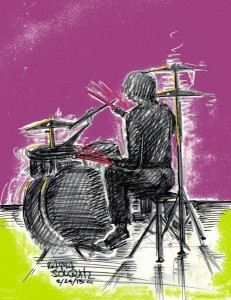 Don hung out at the Theatrical Restaurant. “I was never in the section where you ordered the expensive steaks,” Don said. “I sat at the bar.” He sat behind the featured drummer, behind the bandstand — the best place to watch the drummers’ hands and feet. He saw Cozy Cole, Papa Jo Jones (“He wore white socks”) and Louie Belson, among others.
Don hung out at the Theatrical Restaurant. “I was never in the section where you ordered the expensive steaks,” Don said. “I sat at the bar.” He sat behind the featured drummer, behind the bandstand — the best place to watch the drummers’ hands and feet. He saw Cozy Cole, Papa Jo Jones (“He wore white socks”) and Louie Belson, among others.
“Bob McKee, the house drummer, played a blue onyx Rogers. All the drummers loved that set. It had Swiv-O-Matic hardware. The Japanese copied it. Bobby still has the set in his basement. He’s in his eighties now.
“Philly Joe Jones was at the Theatrical, too. He was more modern than Papa Jo. Buddy Rich was there. Gino too. Gino was a bit past his prime — past his fame.”
“Gino who?” I said.
“Gene Krupa. Everybody called him Gino, at least among friends.”
Ladies and gentlemen, please put your hands together and welcome the coolest guy (by a narrow margin) in Yiddishe Cup: the one and only Don-ny Man-n!
February 27, 2013 2 Comments
SLY AND THE FAMILY STEIN
Beth El–the Heights Synagogue is the cool shul in Cleveland. Beth El recently held a jazz jam night.
Bud Sullivan blew tenor sax in the shul basement. I almost didn’t unpack my clarinet when I heard Bud’s quality licks. I eventually played along to “I Got Rhythm” and read a blog piece.
The rules for the next jazz night at Beth El: no prose or poetry.
I don’t think it was me. A poet read a five-minute screed about Nazi death camps. I — and probably others — hit the scotch schnapps hard after that guy. A comedian followed with Jewish jokes — straight from the Internet — for another five minutes. Deadly.
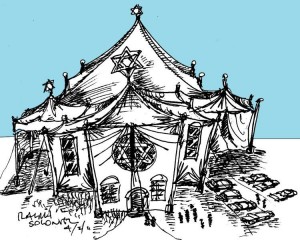 I’m a member of Park Synagogue, a block from Beth El. Park Synagogue is to Beth El as U. of Michigan is to Oberlin. Beth El is crunchy, cool; Park is the “big tent” champion — filled with thousands of hot, cold and in-between Jews. (I like both shuls.)
I’m a member of Park Synagogue, a block from Beth El. Park Synagogue is to Beth El as U. of Michigan is to Oberlin. Beth El is crunchy, cool; Park is the “big tent” champion — filled with thousands of hot, cold and in-between Jews. (I like both shuls.)
At Park Synagogue, I once brought in an Orthodox-style rapper for Purim. The rapper was half Orthodox/half reggae-man. The congregants nearly plotzed: a rap-a-holic in peyes and all- black.

Tamar Gray
This Purim Yiddishe Cup collaborates with a soul singer. Her name is Tamar. Perfect.
Bring your schnapps. You might need it.
Sly and the Family Stein at Park Synagogue.
—
Yiddishe Cup plays Purim at Park Synagogue, Cleveland Heights, Sat. (Feb 23). The service is 7:15-7:45 p.m.; the Jewish music is 7:45-8:45 p.m.; the Sly and the Family Stein portion begins around 9 p.m. Free. Open to the public. Wear a 1960s costume if you want.
—-
I wrote “Rust Belt Chic” for today’s CoolCleveland.com.
—-
This video has some chazones (cantoral music) in it.
Is this what a hipster looks like? . . .
February 20, 2013 3 Comments
DONALD HALL AND U
I was in the grocery store parking lot, listening to Terry Gross interview poet Donald Hall on the radio.
Gross asked Hall how he liked being old. Hall couldn’t complain, he said, but then he did for several minutes. He talked about how he had recently published a story in the New Yorker in which a security guard at the National Gallery had treated 83-year-old Hall like a child; the guard had leaned over to Hall, who was in a wheelchair, and asked, “How was din-din?” (Hall is poet laureate emeritus of the United States and a recipient of the 2010 National Medal of Arts.)
I could listen to Hall talk about aging all day. I didn’t really want to get out of my car and shop for prunes, yogurt and salmon.
I used to be younger. Take 50. In 2000 my then-teenage son attended a New Hampshire summer camp an hour from Hall’s house. I visited the camp on parents’ day. Should I look up Hall, my old English professor? I had studied with Hall 30 years earlier.
Maybe Hall lived way back in the woods. Maybe he sat on his front porch with a shotgun. I didn’t know.
Hall’s house was not deep in the woods. It was about 50 feet from a federal highway and across from a summer camp. (There are a lot of camps in New Hampshire.) He could sometimes hear “Reveille.”
Hall was happy to see me, and said quickly, “I’m rich.” He had made his money mainly from royalties, from a how-to-write college textbook and his award-winning children’s book Ox-Cart Man. Only a poet would ask, “Are you rich?” He added, “How about you?”
“I’m doing OK,” I said. Look, I had a kid at a New Hampshire summer camp. Enough said.
When I had graduated Ann Arbor in 1973, Hall had discouraged me from returning to Cleveland. He had said, “Why do that — to sell insurance?”
Nevertheless, I returned home and “sold insurance.” I entered my family’s real estate biz.

Donald Hall and Bert Stratton, 2000
In New Hampshire, Hall took me to a fancy restaurant near his farm. I said, “I own and manage apartment buildings. I’m a landlord. And I play clarinet.” Meaning I can improvise. I’m still in the arts!
My first year at Michigan, Hall had looked like a stock broker. He went hippie about a year later, I think. In New Hampshire he wore a dye-tied shirt, and I was the guy in the polo shirt.

Donald Hall at his family farm, 2006. (Photo by Ken Williams / Concord Monitor)
Hall quit his tenured job at Michigan in 1975 and moved to his grandfather’s farm near Wilmot, New Hampshire. Hall did freelance writing.
At the New Hampshire restaurant, Hall said he had traveled to the Amazon River on a private jet with a Michigan grad who had made it big in the movie business. The student owned a movie company. Hall said, “His family was in the grocery business in Detroit, until I warped his mind.”
Hall warped many minds. He told me to guard against bitterness. His late wife, poet Jane Kenyon, had died five years earlier at 47. I had known her from English classes.
Hall had endured colon cancer, which was supposed to have killed him, but didn’t. Instead, his wife died from leukemia. He said, “Every generation thinks they know more than the next generation. Schopenhauer was writing about this in the 1700s. You don’t know more than the next generation.” Hall wouldn’t even let me pay the tip.
The next day I drove to Manchester, New Hampshire, and flew back to Cleveland to evict people, fix leaky faucets and collect late rents. It was not poetic.
Eleven years later (2011), I mailed several of my published articles to “Donald Hall, Eagle Pond Farm, New Hampshire.” (He didn’t use email.) I wrote: “From your student — your 61-year-old student.” I dated the cover letter. Hall was always big on dates.
Don wrote back, “I know you know I know that you feel old and know you are not.”
I bought my prunes, salmon and yogurt at the grocery store, plus a couple beers. I want to make it to Hall’s age. On the radio he sounded spry and happy.
—
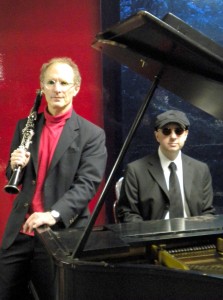 Attention, Michigan residents. Please come to the Klezmer Guy show at The Ark, Ann Arbor, Feb. 15. 8 p.m. $20. Features Bert Stratton on clarinet and prose, Gerald Ross on ukulele and Hawaiian lap steel guitar, and Alan Douglass on piano, sunglasses and vocals.
Attention, Michigan residents. Please come to the Klezmer Guy show at The Ark, Ann Arbor, Feb. 15. 8 p.m. $20. Features Bert Stratton on clarinet and prose, Gerald Ross on ukulele and Hawaiian lap steel guitar, and Alan Douglass on piano, sunglasses and vocals.
—
Attention, Clevelanders. Attend Purim at Park Synagogue, Cleveland Heights, Feb. 23. Yiddishe Cup becomes Sly and the Family Stein on Purim. We’re going to play Jewish music and soul music. Free. Open to the public. 7:30 p.m.
February 13, 2013 4 Comments
MISSISSIPPI BUBBE AND
THE XYLOPHONIST
I look for musical yikhes (lineage/pedigree) wherever I can find it. My grandmother played piano at a white Baptist church in Yazoo City, Mississippi. Not bad.
This Mississippi bubbe — Ida Kassoff Zalk — had a brother, Earl Kassoff, in Cleveland. Earl was a drummer, xylophonist and house painter. He went by the stage name Earl Castle, and led bands in the 1930s and 1940s.
In the 1990s — when I first began looking for musical yikhes — I couldn’t find much info on Earl. I talked to a couple relatives. Earl didn’t leave behind sheet music or tune books. He died in 1969.
At a Yiddishe Cup gig, an elderly musician schmoozed with me. I asked him if he knew Earl Kassoff. Yes, he remembered Earl. The schmoozer was Harold Finger, age 77. He had made a living playing clarinet and sax during the 1930s and 1940s.
I took my tape recorder to Harold’s apartment and interviewed him. He said there were “four or five bands that got the Jewish work.”
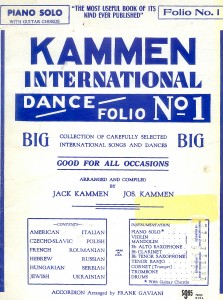 I asked, “What bands?” He didn’t remember the names. “What were the most popular Jewish tunes?” I said.
I asked, “What bands?” He didn’t remember the names. “What were the most popular Jewish tunes?” I said.
He said, “The songs from the Kammen Book. That was the big thing.”
The Kammen International Dance Folio, published in 1924, is still around. The Kammen book is to Jewish music what a sex manual is to sex. (Pianist Pete Sokolow makes this statement at most KlezKamp conventions.)
My Uncle Earl’s band did mostly “dance work” — American music, Harold said. Earl worked the downtown theaters, as well as the Golden Pheasant — a Chinese restaurant where Artie Shaw started.
Harold said he didn’t stick to the melody all the time. He did some “faking” (improvising). Now he played clarinet with a community orchestra. “I don’t do much jobbing anymore,” he said. (Jobbing is gigging.)
Harold died three years after the interview. I thought his kids might enjoy the interview tape, from 1992, so I called a Finger relative and left a message in the mid-1990s.
I didn’t hear back.
The relative should have called! Harold’s wife was on the tape, teasing Harold about how he loved his saxophone more than her. Harold said, “What? I quit playing music for you!”
—
 Michiganders, come to the Klezmer Guy show at The Ark, Ann Arbor, Feb. 15. 8 p.m. $20. Bert Stratton on clarinet and prose, Alan Douglass on piano and vocals, Gerald Ross on ukulele and Hawaiian lap steel guitar. Prose pieces will contain words such as “Ann Arbor,” “Michigan” and “Rudy Tomjanovich.”
Michiganders, come to the Klezmer Guy show at The Ark, Ann Arbor, Feb. 15. 8 p.m. $20. Bert Stratton on clarinet and prose, Alan Douglass on piano and vocals, Gerald Ross on ukulele and Hawaiian lap steel guitar. Prose pieces will contain words such as “Ann Arbor,” “Michigan” and “Rudy Tomjanovich.”
—
More on Mississippi Ida — my bubbe — later. Maybe not.
—
Yikhes update. Check out the latest from Jack Stratton’s band, Vulfpeck.
February 6, 2013 6 Comments
SCHOOLBOARDING (TORTURE)
I interviewed for a position on the library board.
I like to read, and I know two people who have been on the board and liked it.
I wondered, “Will the school board ask me what books I’m reading?” (The school board oversees the library board.)
In 1967 at Johns Hopkins’ admissions office, I talked about my Holocaust reading. The Holocaust wasn’t yet the “Holocaust.” I made a good impression in Baltimore, I think. (I was pre-med.)
Re: the library board interview. I recently read How Music Works by David Byrne and Shit my Dad Says by Justin Halpern. I have also read to page 100 in Malamud’s A New Life, a novel about a college instructor. For the first fifty pages, I was interested in the goings-on of a 1950s college English department. Then less so.
Nevertheless, “I’m reading Malamud” might be the ticket.
The members of the school board sat on a dais at the board of education building, and I took the “witness stand” in the center of the room. Only three school board members — out of five — showed up. One MIA board member was a playwright; the other, a guy from my synagogue. My A-team was absent!
Question 1: How would you make the library better for students?
Students? They are the species who play computer games and horse around in the teen room? I’ve been in that room, like, never. “I would maintain the library as a first-class multicultural, multimedia center,” I said.
Question 2: What do you do at the library besides take out books?
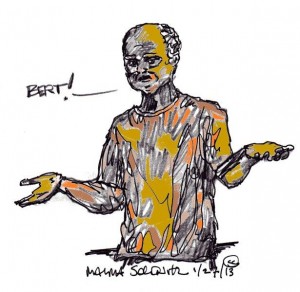 Not much! “I was at the dedication of the Harvey Pekar statue,” I said.
Not much! “I was at the dedication of the Harvey Pekar statue,” I said.
Question 3: What would you do to help the library’s finances?
“I vote for the levies.” What about Malamud?
Question 4: Are you willing to commit to a seven-year position?
“Yes, but actuarially speaking, who knows.”
A chemist beat me out for the job. In an email, the library director thanked me for applying and encouraged me to apply again.
First I need to walk through the teen room and get a better feel for the young adults’ needs. I’ll do that right after I finish Malamud’s A New Life.
—
Side B
MR. OO
I got a call from Oo (rhymes with “boo”), looking to open an Asian food market.
I said, “How do you spell that?”
“O, O.”
“O, O, 7?”
“Yes. Hah-hah.”
“Is Oo your first name.”
“No, that’s Kyawswar.”
“You Chinese?”
“No, I’m from Burma.”
“Close enough,” I said.
“Yes, very close.”
“Is this going to be an American mini-market or an Asian market?” I said. “I don’t want 40-ounce malt liquor and cigarettes.”
“Asian market, sir. Our people like rice, the vegetables, avocados. Maybe cigarettes. The high school boys from the school [across the street] buy the fruit juices.”
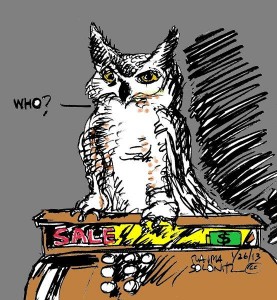 Oo rented the store. He’s industrious. He owns two sushi stands at Giant Eagles. That’s not all . . .
Oo rented the store. He’s industrious. He owns two sushi stands at Giant Eagles. That’s not all . . .
I told my wife, “Oo had a nail salon.”
“Who?” she said.
“Oo.”
—
Footnote: Consider “U Thant,” the former UN secretary general from Burma. Thanks to Ted Stratton for this U/Oo connection.
—
Byliner chose my essay “The Landlord’s Tale” (City Journal) as one of the top 102 nonfiction journalism pieces of 2012. Read the essay here.
January 30, 2013 3 Comments
IN JEOPARDY
At a Detroit wedding, the bride came down the aisle to Barbra Streisand recordings. She paused several times to read from her childhood diaries. She had 109 journals. (She read only from a handful.)
Eight years later, the bride emailed me and asked if I remembered her.
Yes. And I remembered the bridal dance we had played, and how we opened for a soul band (a good band), and how I announced the bridal party individually; one groomsman was Billy Wisse.
I had said Billy Weiss. He thanked me. I explained to him, “There’s a Ruth Wisse, a Yiddishist and professor at Harvard. I’ve heard the name pronounced before.”
“That’s my mother,” Billy said.
“No! Where do you teach?” I said. The Wisse family is scholarly; David Roskies, Ruth Wisse’s brother, is a professor at the Jewish Theological Seminary.
Billy said, “I write questions for Jeopardy.”
“That’s a job?” I said, pulling out a pen and jotting down Billy’s email address. My son Teddy — a college student then — would love a job at Jeopardy upon graduation. Teddy was on Brandeis’ Quiz Bowl team. (Quiz Bowl is Jeopardy minus the money.)
Two years later, Brandeis played in Los Angeles for the national championship. Teddy was on the Brandeis team. I gave Billy’s email to Ted.
Ted and his Brandeis teammates met with Billy Wisse for breakfast at Canter’s Deli.
Two years after that (2004), Ted got a business call at our house. He had recently graduated college. He wouldn’t pick up the phone. I yelled, “Pick up the phone, Teddy! It’s for you.”
Sony was on the line.
Sony owns Jeopardy. Sony offered Ted a slot on Jeopardy as a contestant. Sony sent a contract via FedEx. One paragraph read (paraphrased): “Do you know anybody from Sony or Jeopardy? If so, you can not be on the show.”
Teddy did not know Billy Wisse! Teddy and Billy Wisse ate breakfast two years prior for one-half hour. Also, there had been other Brandeis players at that breakfast.
At Sony Studios in Culver City, California, Billy Wisse stood by a computer at the edge of the Jeopardy set. Alex Trebek, the show’s host, wore a cast on his wrist. He had fallen off a ladder, he told the studio audience. He had been cleaning his gutters. Sounded odd to me. (I was in the peanut gallery.) A Hollywood guy cleans his own gutters? Maybe. There are low gutters in California.
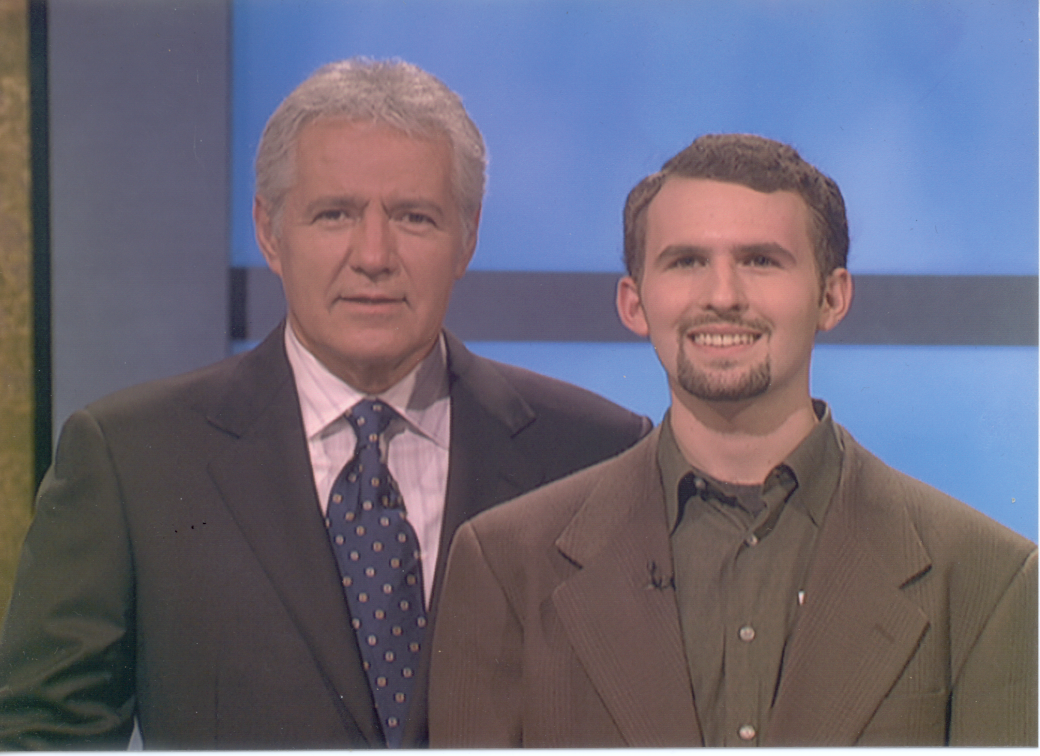
Alex Trebek and Ted Stratton, 2004. (Show aired in 2005)
Jeopardy tapes five shows a day. The show’s contestants for that day sat in rows isolated from the studio audience. Whenever an on-deck contestant went to the bathroom, he or she was escorted by a guard from Standards and Practices, which monitored cheating.
The first game was between an Idaho man, a Washington state woman, and the defending champ, “a schoolteacher from Lancaster, Ohio.”
The Jeopardy stagehand said, “Lights, camera.” But no “action.” Wisse and other Jeopardy employees huddled at the side of the set. They looked at computers and talked to each other. This went on for about a half hour.
Wisse, you do not know my son. Have rachmones (pity), Wisse. You see 11 Jeopardy contestants per day; they’re mostly all young white guys who look alike. You do not know Teddy!
The Jeopardy people couldn’t locate the appropriate random packet of questions for the first game. That was the hold-up. Everything had to be kosher — up to Standards and Practices.
Teddy didn’t play that morning.
Lunch break was at Quizno’s for the peanut gallery. (The contestants ate in the Sony cafeteria.) At Quizno’s, the girl friend of one contestant said, “I don’t care if Jonathan wins or loses. I don’t love him for his game playing.”
Shut up. I was so nervous I couldn’t eat.
Teddy didn’t play the game after lunch either. I asked an usher, “What if my son doesn’t play today?”
She shrugged.
Teddy made it onto the final game of the day. He faced a Boston book editor — the defending champ — and “a graduate student originally from Johnson City, Tennessee.” That was Jeopardy-speak for “a graduate student now living in Cambridge, Massachusetts, doing a post-doc at MIT.”
Ted did well in the Double Jeopardy category “Our Lady,” about Catholic shrines. The “Our Lady” questions covered Our Lady of Czestochowa (Poland), Our Lady of Gethsemane (Kentucky) and several others. This is what my son learned at Brandeis.
Heading into Final Jeopardy, the Tennessee grad student was in first place. Ted was in second, and the defending champ, Boston book editor, was in third.
The Final Jeopardy category was Fictional Children. The answer was: “This boy, introduced in a 1902 book, flew away from his mother when he was 7 days old.”
I felt like I was watching my kid line up a 50-yard field goal at the Ohio State-Michigan game with one second left on the clock. That is the weird part about being a parent — all that collateral joy and pain. Merv Griffin’s Jeopardy think-music ended.
The Boston editor, in third place, answered, “Who is Peter Pan?”
Right-o. She went up to $10,900.
Teddy said, “Who is Peter Pan?” Right. He went up to $13,399.
The graduate student from Tennessee said, “Who is the Little Prince?” He went down to $7,900.
Alex Trebek announced, “The new champion, Ted Stratton, a reporter from Cleveland Heights, Ohio!”
—
Footnote: For $500, “Who is Billy Wisse?” Answer: a mentsh.
For a blow-by-blow of the game, see Robert KS’ J! Archive.
January 23, 2013 No Comments


